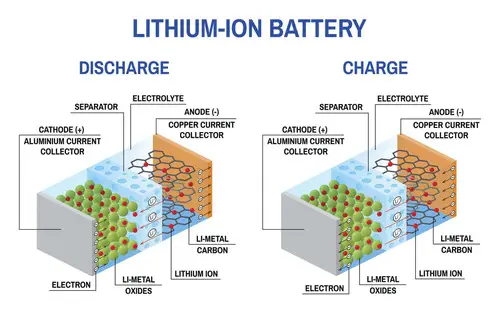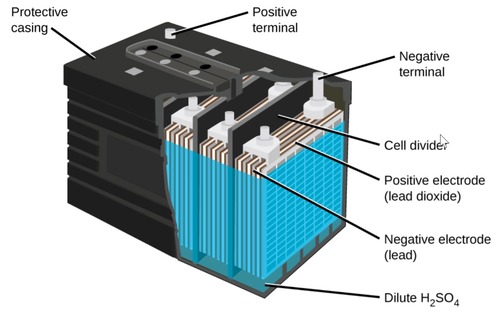Do you know the Types Of Batteries Used In Electric Vehicles?
The craze for electric vehicles is at an all-time high due to the growing environmental concern and rising fuel costs.
With different government subsidies in place, people are shifting towards EVs, especially in the two-wheeler segment.
One of the most critical components of an EV is the battery pack. The battery pack drives the motor and, thus, the vehicle.
The cost of an EV battery is almost half of the vehicle cost. So, to make a wise decision, we must know about the types of batteries used in electric vehicles.
What Does A Battery Mean To EV?
A battery is the heart of an EV. It drives the motors and other supplementary equipment. A battery pack usually contains several cells, each with a specified voltage.
All batteries have a negative and a positive electrode. When the terminal is connected to electrical power, electrons flow from the negative to the positive, and the battery stores the energy.

Similarly, electrons flow from the positive to the negative electrode when the battery discharges. When there is no electron flow, the battery is considered dead.
Depending on the type of battery, a battery typically lasts for a couple of hundred miles. Here, I am talking about the traction battery, not the auxiliary one.
A traction battery drives the motor, whereas an auxiliary battery powers supplementary devices in the vehicle.
Most manufacturers offer an 8-year and 160000 km warranty on the battery. That does not mean that the battery will die after 8 years.
You won’t get the same range as when the battery is new. Lithium-ion EV batteries degrade at around 3-5% per year.
Types Of Batteries Used In Electric Vehicles
There are mainly three battery types used in electric vehicles. Although there are many sub-types, the core technology remains the same.
- Lithium Ion Battery
- Nickel-Metal Hydride Battery
- Lead-Acid Battery
Lithium Ion Battery
Lithium-ion batteries are popular because of their high energy density. This means more energy can be stored in less space. A typical lithium-ion battery has an energy density of more than 140 Wh /kg.
Lithium-ion batteries have been the best types of batteries used in electric vehicles for a long time.

Due to their high energy density, lithium-ion batteries are ideal for EVs. They consume less space and are also 1/3 lighter than similar-capacity battery types available on the market.
These batteries are also good at high temperatures, which is a plus as EVs are usually exposed to high temperatures.
These batteries are the best for self-discharge, as they discharge only 2-3 percent daily. If you are unsure what self-discharge means, it is the rate at which batteries discharge when unused.
Due to the low discharge rate, it can hold a charge for a longer time. A typical lithium-ion battery should last for the life of the vehicle. If not, easily it can survive 8-10 years or 200K-300K miles considering you are following all the best practices of using the battery.
Lithium-ion batteries can be recycled with minimum waste. However, companies still lack a proper plan to recover used batteries.
The manufacturing cost of lithium-ion batteries is 40% higher than other batteries. However, their high energy density and resistance to temperature make them ideal choices for EVs.
Types Of Lithium Ion Batteries Used In Electric Vehicles
There are different types of Lithium-ion batteries used in EVs
- Lithium iron phosphate (LFP)
- Lithium Titanate Oxide (LTO)
- Lithium-Ion Cobalt Oxide (LCO)
- Lithium Nickel Cobalt Aluminum Oxide (NCA)
- Lithium-Ion Manganese Oxide (LMO)
- Lithium Nickel Manganese Cobalt (NMC)
Nickel-Metal Hydride Battery (NiMH)
NiMH batteries are a cheaper alternative to Lithium-ion batteries, although their energy density (around 60-100 Wh/kg) is very low, and their self-discharge rate is very high.

These batteries are suitable for hybrid cars, where there is no need to charge the battery externally. They are charged only by the regenerative braking mechanism.
The regenerative braking mechanism converts some kinetic energy to heat while applying brakes. This recovered heat charges the battery.
NiMH batteries are sufficient for light applications where the battery is not the only power source for driving the vehicle, such as in full-hybrid cars.
NiMH batteries are safe for EVs and do not explode at high temperatures. Their typical lifespan is around 4-5 years and lasts 100 K—150K miles.
Lead Acid Battery
The lead-acid battery is the oldest battery technology used in EVs. It was invented in 1860 and was used in EVs until 1980.
It was then replaced by NiMH and Lithium Ion batteries, which offer better energy density and a low discharge rate. However, NiMH batteries are cheap and highly efficient.

The batteries used in IC engine vehicles are mostly lead-acid batteries. They have a life span of around three months to two years, and a regular checkup of electrolyte solution is required to improve their life. Lead-acid batteries are recyclable.
Things To Consider While Choosing A Battery Type for EV
Choosing the right battery type is essential when you choose an electric vehicle. As I said before, the battery is the heart of the machine. Any wrong selection will cost you in the future.
Here are some parameters you should consider when choosing an EV battery.
Range
The number of miles a battery can hold a charge is called its range. A battery with a high kWh rating does not necessarily offer a better range.
It all depends on the battery types, the number of cells in the battery pack, and the optimization of the Battery Management System.
Due to their high energy density, lithium-ion batteries offer the best possible range in an electric vehicle with limited space.
Life Span
Life span plays a significant role in choosing the battery types of EVs. A typical lithium-ion battery lasts around 160K-200K KM, suitable for 8-10 years. Conversely, a NiMH battery may last only 3-5 years.
Battery replacement is costly (often 50% of the vehicle cost), so choosing the right battery type is crucial.
Please remember that even the best battery will degrade at a rate of 3-5% per year.
Safety
Due to the use of the right battery type, new-generation EVs are much safer than before. We might have heard about EVs catching fire, but we never know what caused them. It could be the wrong battery, or these batteries were exposed to harsh environments.
Battery types like lithium-ion and NiMH can survive high temperatures and, to a certain extent, can withstand water.
EVs with these battery types can be exposed to harsh conditions, considering we are not operating beyond safety limits.
Cost
When considering range, life span, and safety, you must sacrifice the cost parameters. All other parameters come into the picture at a cost.
Either pay a little more and get a safe battery or sacrifice safety for cheap batteries.
Conclusion: Electric Vehicle Battery Types
90% of EVs in the market today use lithium-ion batteries. These are safe, offer battery energy density in a given space, and last almost the vehicle’s life.
However, lithium-ion batteries cost almost half the price of a vehicle. New technologies are evolving, and we might see better battery technology that is cheap, safe, and takes less time to charge.
FAQ: Types Of Batteries Used In Electric Vehicles
What Type Of Batteries Do Electric Cars Use?
Most electric vehicles use safe lithium-ion batteries, which can withstand high temperatures, offer high energy density, and can last a long time due to their low self-discharge rate.